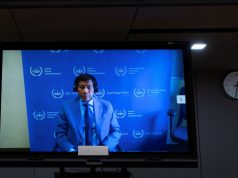President Rodrigo Duterte recently kissed a female overseas Filipino worker on the lips during his visit to South Korea, prompting some social media reactions pointing out the role of power and position in the picture.
In a series of tweets, entrepreneur Rosario Juan wrote that even though the female OFW consented to the kiss, there was an evident “power play” present because Duterte is an individual who wields authority while the OFW was an ordinary person in the scenario.
Na stress ako that a public official of the highest rank, a father, husband and supposed role model is behaving inappropriately. (Pero di naman tayo nagulat diba?)
Na stress ako na masyadong supportive ang crowd.
Na stress ako na okay lamg kay ate gurl.
1 of 2
— Rosario Juan (@juanxi) June 4, 2018
So…baliktad na ang mundo? Those of us clamoring for basic decency are just prudes?
How to process the fact that a high ranking, leader of a nation just normalized grabbing people for mouth kisses?
How to process the fact that consent was freely given for this act?
2 of 2
— Rosario Juan (@juanxi) June 4, 2018
When another user commented that the female OFW was “pressured” at that time, Juan replied:
“Pero mali pa rin. So kailangan himayin ang sitwasyon. Lagyan ng context. The power play. The jeering of the crowd. The fact that the president should not have even initiated it!”
A different user shared a similar observation.
This is so kadiri in the highest level. Clearly, this is a play of power. Kahit may consent si girl, he is the president, he should've known better. Or people that are part of the phi contingent should've known that this is clearly, inappropriate. 🙄😳
— epdeguzman17 (@epdeguzman17) June 4, 2018
Miguel Lizada, a Ph.D. candidate at the University of Hong Kong, argued that the whole affair is about how Duterte practices his power as an authoritative figure among women—not about the OFW’s consent.
DDS frame it as an issue of the woman's agency. Pumayag naman daw and, accdg to Contreras, it is the critics who are depriving her of agency. Kabobohan. It's not about her consent; it's the fact that the request can be given in the first place. This isn't about consent but power.
— Miguel Lizada (@mlizada) June 4, 2018
Women’s group Gabriela has strongly condemned Duterte’s act, saying it was “disgusting theatrics of a misogynist president who feels entitled to demean, humiliate or disrespect women according to his whim.”
The meaning of power play
Psychology Dictionary defines “power play” as an “aggressive method or plan utilized to reach an end, frequently via the coercion of other people.”
These are usually done by people in authoritative positions like government officials, managers and chief executive officers, for instance.
These people use their wealth, social status and influence over others to get what they want, even when it is unethical or inappropriate.
Social psychologist Adam Galinsky noted that people who abuse their power know that they have “resources” needed by the less powerful person.
In the video, Duterte called the female OFWs because he knew they are elated over seeing him, being the highest government official in the Philippines.
“When I have all the resources I need, I’m not dependent on others, therefore they don’t have power over me. But if I have resources other people want, then I have power over them,” Galinsky said, explaining how the mind of a potential power player works.

Psychology emeritus professor Christopher Kilmartin of the University of Mary Washington said, “Powerful people often surround themselves with people who enable them and who won’t challenge them.”
In a press statement, Sen. Risa Hontiveros slammed Duterte’s action and said that “uneven power relations” were at play in that particular situation:
“It was not a meeting of two consenting individuals on equal terms. Uneven power relations were clearly at play. And President Duterte took advantage of that severe power disparity.”
The disparity in the scenario was how the female OFWs—two ordinary people—were asked by Duterte—a high-ranking government official—to subject themselves in an action deemed publicly inappropriate by critics.
When does power play lead to sexual harassment?
The Wall Street Journal reported that five studies have already been published suggesting that “power can create opportunities for men to mistreat women.”
Psychology professor Neil Malamuth of the University of California noted that men who harass and sexually assault women have certain characteristics that are “amplified by power.”
He reiterated that power does not necessarily corrupt them but they use their power in that manner—to assert their perceived sexual dominance over women.
“It’s not automatic; it’s not that power corrupts. It’s a certain type of man who uses his power in this way,” Malamuth said.
An article by Huffington Post also stressed that sexual harassment is not about the act but the whole dynamics of power between the assaulter and the one being assaulted.
“It’s about the objectification of a victim, emphasizing their role as a helpless subordinate,” it noted.
Psychology professor Shaw Burn of California Polytechnic State University added that issues of entitlement, power and unchecked control could lead men to exhibit behaviors of sexual assault.
“Not all people handle power and money with grace. Some use their power to exploit and maltreat others, knowing they can get away with it, and some getting off on it,” she said. — Video report by Uela Badayos









